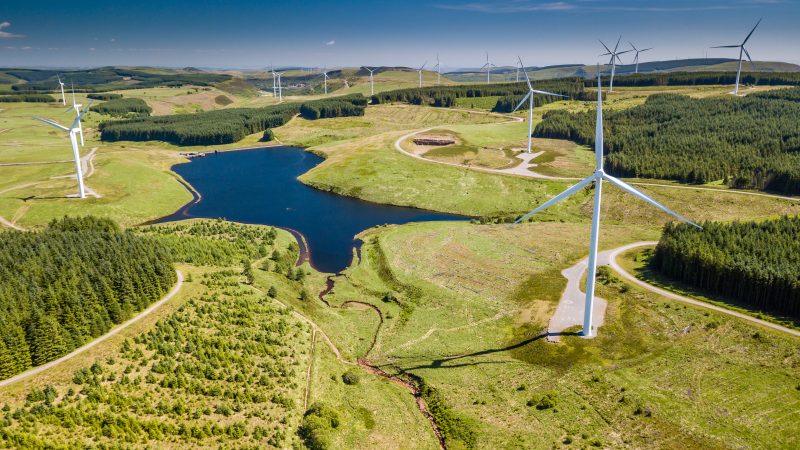
Coronavirus is the biggest crisis our country has faced in a generation. As well as the severe public health emergency, it also threatens the economy and our social fabric. We now confront the deepest recession for 300 years and stand on the brink of the worst jobs crisis since the Great Depression.
Meanwhile, as the fires that have again raged this year from Australia to California so vividly illustrate, the climate and environment crisis is gathering pace. These multiple, intersecting crises demand urgent and coordinated action.
We have a chance to turn the threat of long-term mass unemployment into an opportunity to create decent green jobs in every region of our country; to build up skills in the workforce, including among groups hardest-hit by the pandemic; to stimulate an economy at risk of severe recession with massive investment in green infrastructure, from wind farms to wetlands; and to tackle longstanding regional inequalities.
That is why yesterday Labour called on the government to stop dithering and support a bold green economic recovery from coronavirus. We challenged them to urgently bring forward an ambitious stimulus package of capital investment to help support the creation of up to 400,000 new low-carbon jobs in every region of the country over the next 18 months.
The government has talked a good game when it comes to a green recovery, but its co-opting of the ‘build back better’ rhetoric has not been matched by meaningful investment. According to Carbon Brief, Germany has committed €42.85bn and France €35bn to a green recovery. Meanwhile the UK has committed just a fraction of that, at less than £5bn. And while the US Senate election results may hamper his ability to deliver it, let’s not also forget that President-Elect Biden has just been elected on a platform to deliver $2tn in green investment.
The complacency that defines the government’s approach to a green recovery is all the more bewildering given the fact that not only is it not on course to meet the 2050 net-zero target that parliament legislated for last year, it’s lagging far behind what is needed even to meet previous, less stringent, emissions targets. Despite parliament having declared a climate and environment emergency, IPPR estimates that the government has so far committed to investing just 12% of what is needed to achieve the UK’s net-zero target. It is not good enough.
We must urgently accelerate the transition toward carbon neutrality. It is imperative that the government does not lose sight of the importance of preparing for the next global crisis as it deals with the current one.
But a green economic recovery is only the first step. We have now entered the decisive decade in the fight against runaway global heating. If we’re to avert the worst impacts of catastrophic climate change, an ambitious green stimulus must be the precursor to bold and sustained climate action at home and abroad – not least to ensure the success of the crucial COP26 climate summit that the UK hosts in Glasgow next year and keep the hope of limiting global heating to 1.5°C alive.
In the critical years ahead, Labour will continue to hold the government to account and develop our vision of the green industrial revolution needed to meet the climate emergency and rebuild Britain. In taking on that challenge, three principles will guide our approach. The first is the need to recognise the immensity of the challenge ahead and to be honest and open about the inherent trade-offs involved in reaching net zero. The government consistently fail to do either. Their approach, one that combines distant targets with limited investment and a faith in the power of emerging green technology, is not going to be enough. We must push for an increase in the pace and scale of our investment, and for clear leadership of the kind that will sustain public support for the green transition.
The second is consistency. The climate crisis demands demonstrable action at home and abroad. It does not allow for the kind of self-defeating policy-making that has seen the government funnel £6bn of public money into fossil fuel projects around the world, withdraw subsidies for solar and onshore wind, and sell off Britain’s Green Investment Bank.
That’s why Keir Starmer has called for climate action to be “hardwired into every level of government” and the Shadow Chancellor has committed to “testing every single budget line against the goal of net zero carbon emissions”. It’s also why Labour has set up a shadow cabinet climate action committee, and why as shadow climate minister I’m assessing all policy development for its impact on the net-zero target.
The third is the importance of putting fairness at the heart of the transition to a low-carbon economy. Leaving things to the market risks deepening existing political divides, accentuating economic imbalances, and causing damage of the kind that still scars those people and communities who experienced the deindustrialisation of the 1980s. We cannot let that happen again.
We must instead ensure that people and places are included and protected through the green transition, directing the process so that it also addresses the structural inequalities that afflict our country, and taking that same approach into the international arena so that the impact of climate change is shared equitably and we fulfil our historic responsibility to support climate action and adaptation in poorer countries.
These are the principles that Labour will be fighting for in the coming months and years. They represent a commitment to the idea that in responding effectively to the climate and environment emergency we can and must seize the opportunity to create a fairer, more prosperous, and more equal country.




More from LabourList
Nudification apps facilitate digital sexual assault – and they should be banned
Diane Abbott suspended from Labour after defending racism comments
Labour campaign groups join forces to call for reinstatement of MPs